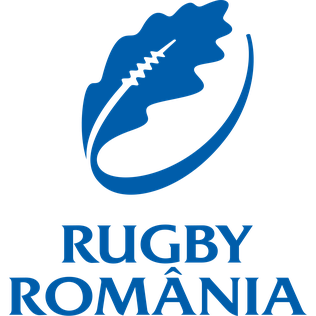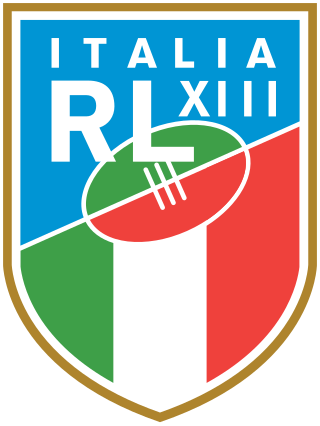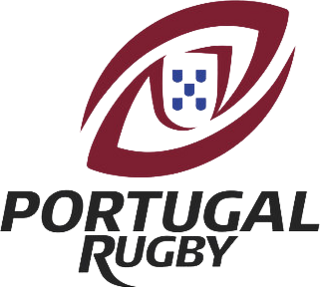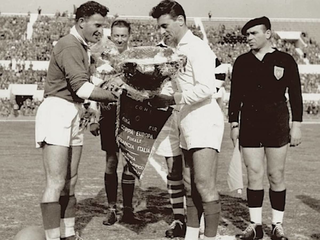
The Italy men's national football team has represented Italy in international football since its first match in 1910. The national team is controlled by the Italian Football Federation (FIGC), the governing body for football in Italy, which is a co-founder and member of UEFA. Italy's home matches are played at various stadiums throughout Italy, and its primary training ground and technical headquarters, Centro Tecnico Federale di Coverciano, is located in Florence. Italy are the reigning European champions, having won UEFA Euro 2020.

The Italy national rugby union team represents Italy in men's international rugby union. The team is known as gli Azzurri. Savoy blue is the common colour of the national teams representing Italy, as it is the traditional colour of the royal House of Savoy which reigned over the Kingdom of Italy from 1860 to 1946.

The Romania national rugby union team represents Romania in men's international rugby union competitions, nicknamed Stejarii, is long considered one of the stronger European teams outside the Six Nations. They have participated in all but one Rugby World Cup and currently compete in the first division of the European Nations Cup, which they won in 2017. Rugby union in Romania is administered by the Romanian Rugby Federation.

The Italy national rugby league team represents Italy in rugby league football. With origins dating back to the 1950s and 1960s, the team has competed regularly in international competitions since 2008, when their current governing body, the Federazione Italiana Rugby League, was formed. They are currently ranked 16th in the IRL World Rankings.

Mirco Bergamasco is an Italian rugby union and rugby league footballer. Bergamasco has played both rugby league and rugby union, and is a dual-code rugby international, having played for both the Italy national rugby union team and the Italy national rugby league team. He primarily plays at centre or wing. He played in the 2003, 2007 and 2011 Rugby World Cups as well as the 2017 Rugby League World Cup.

The Portugal national rugby union team, nicknamed Os Lobos, represents Portugal in men's international rugby union competitions. The team, as well as all rugby union in Portugal, is administered by the Federação Portuguesa de Rugby.

Alexandru Penciu was a Romanian rugby union player and coach, who played as a fullback or centre. Amongst the best players of all time, he was nicknamed "Alexander the Great" in his home country.

The Europe Cup 1954 was the fifth Rugby Union European championship, organised by FIRA and the second with this name.
The Nations Cup 1965–66 was the sixth edition of a European rugby union championship for national teams and was the first with this name. After the 1954 European Cup, the FIRA did not organize any championship. During the 1964 general assembly in The Hague, it was decided to organize a tournament as a league championship. The teams would be divided in two divisions, with a process of promotion and relegation. The first edition was played between 1965–66. Italy, France, and Romania already played against each other regularly in test matches, so it was easy to arrange this kind of tournament.
The Nations Cup 1966-67 was the seventh edition of a European rugby union championship for national teams, and second with the formula and the name of "Nations Cup". The Tournament was won by France, who swept all their matches, with Romania, Italy and Portugal. Portugal, who had the chance to play with the three best teams from Continental Europe, achieved an honourable 6-3 loss to Italy, but, having lost all their matches, were relegated. France did not award caps in their 56-14 win over Portugal abroad.
The Nations Cup 1968–69 was the ninth edition of a European rugby union championship for national teams, and fourth with the formula and the name of "Nations Cup".
The Nations Cup 1969–70 was the tenth edition of a European rugby union championship for national teams, and fifth with the formula and the name of "Nations Cup".
The Nations Cup 1970-71 was the 11th edition of a European rugby union championship for national teams, and sixth with the formula and the name of "Nations Cup".
The Nations Cup 1972-73 was the 13th edition of a European rugby union championship for national teams, and eighth with the formula and the name of "Nations Cup".
The 1985–87 FIRA Trophy was the 26th edition of a European rugby union championship for national teams. It was played along two seasons
The 1989–90 FIRA Trophy was the 28th edition of a European rugby union championship for national teams. The format returned to a one-year tournament, with each team facing each other only once.
The 1990–92 FIRA Trophy was the 29th edition of a European rugby union championship for national teams. The format returned to a two-year tournament.
The 1995–1997 FIRA Trophy was the 31st edition of the European rugby union championship for national teams. The 1995-97 edition was arranged once again with a new format.
The 1996–97 FIRA Tournament was the 32nd edition of the European rugby union championship for national teams organized by the Fédération Internationale de Rugby Amateur (FIRA).
The 2009 Campeonato Argentino de Rugby was won by the selection of Cordoba that beat in the final the selection of Tucumàn







